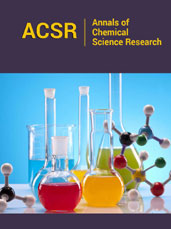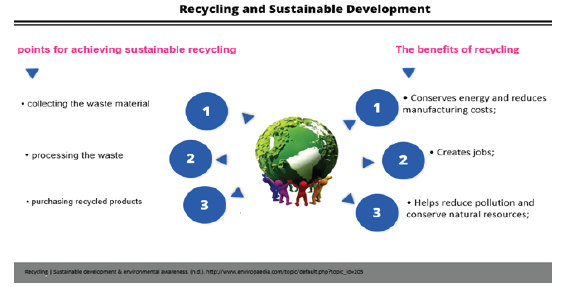- Submissions

Full Text
Annals of Chemical Science Research
Recycling and Sustainable Development
Nandkishor Lodhi, Chadar SN*, Deshraj Singh Thakur and Ashish Raikwar
Department of Chemistry, Govt. Autonomous Girls P.G. College of Excellence Sagar, India
*Corresponding author:Chadar SN, Department of Chemistry, Govt. Autonomous Girls P.G. College of Excellence Sagar, India
Submission: March 08, 2024;Published: May 27, 2024

Volume4 Issue5May 27, 2024
Abstract
The concept of sustainable development has received so much attention in recent years the international community focuses on environmental issues. Recycling is significantly important in promoting sustainable development by decreasing resource depletion, waste generation and environmental harm. This article offers a thorough examination of how recycling and sustainability intersect. Reviewing over the principles of sustainable development, systematically exploring the environmental, economic, and social aspects of recycling is utmost necessary. Let us examine the crucial role that recycling plays in achieving sustainable development goals. The paper also carefully analyses the current recycling practices, technological developments, regulatory frameworks and recycling practices across cities. Using an immeasurably multidisciplinary approach, this article sincerely describes the enormous potential of recycling as an enabler of sustainable development and provides immensely significant recommendations for strengthening recycling to effectively support the future.
Figure 1:

Keywords: Environmental; Recycling; Sustainability; Developments
Introduction
Recycling is a crucial aspect of sustainable development, promoting resource conservation, pollution reduction, and planet preservation [1]. Recycling helps in lowering the demand for extracting resources, thus preserving natural resources such as forests, minerals, and water. By using recycled materials significantly reduces greenhouse gas emissions as less energy is needed for manufacturing products. Additionally, recycling helps in reducing the pressure on landfills and incinerators, which emit methane gas. Moreover, recycling creates job opportunities, boosts the economy, and promotes responsible consumption patterns [2,3]. It embodies principles of resource efficiency, environmental protection and social responsibility, serving as a catalyst for positive change on both local and global scales.
Recycling
Recycling stands as a powerful tool in the arsenal of environmental conservation, offering a multitude of benefits that extend far beyond waste reduction. As societies aim to reduce their impact on the environment and address the challenges of climate change, it is becoming more important to recognize the environmental advantages of recycling. Recycling is crucial for protecting our planet’s health and integrity by conserving resources and reducing pollution [4].
Protecting and Sustaining our Natural Resources
Valuable natural resources can be conserved through recycling, which reduces the need for extracting raw materials [5]. Materials such as paper, glass, metals and plastics can be reprocessed and reused in the manufacturing process, alleviating the pressure on forests, mines and other finite resources. By recycling and prolonging material lifespan, we can safeguard forests, habitats and mitigate the environmental impact of resource extraction.
Saving Energy and Reducing Greenhouse Gas Emissions
The energy needed to produce goods from recycled materials is generally lower than that required for extracting and manufacturing virgin materials. Industries can greatly decrease their energy usage and greenhouse gas emissions by incorporating recycled materials into their production methods [6]. Lowering carbon dioxide emissions and other pollutants through energy savings helps combat climate change caused by resource extraction, transportation, and manufacturing.
Reduction of Landfill Waste
Recycling redirects materials away from landfills, thereby diminishing the quantity of waste that gathers within these establishments. Landfills pose significant environmental risks including soil and water pollution, the emission of greenhouse gases, and the disturbance of natural habitats [7,8]. By diverting waste via recycling initiatives, we are able to mitigate the burden on landfills and mitigate the accompanying environmental risks.
Preservation of Ecosystems and Biodiversity
Recycling helps protect ecosystems and preserve biodiversity by reducing the demand for raw materials extracted from natural habitats. Resource extraction often leads to habitat destruction, deforestation, and loss of biodiversity [9]. Recycling paper, cardboard and wood can help decrease the demand for tree harvesting and minimize the damage to forests and other important ecosystems.
Pollution Reduction
Recycling plays a crucial role in reducing pollution by limiting the amount of harmful substances released into the environment. On the other hand, incinerating waste can result in the release of toxins and pollutants into the air, soil, and water, which can pose serious threats to both human health and the environment [10]. By recycling materials instead of incinerating or landfilling them, we can reduce air and water pollution, protect wildlife, and promote a cleaner, healthier environment [11,12].
Importance of Recycling in Daily Life
The significance of incorporating recycling into our daily routines cannot be emphasized enough, as it has a direct effect on both our personal welfare and the overall health of the environment. Here are some crucial reasons why recycling is vital in our everyday lives.
Conservation of Natural Resources
Recycling aids in the preservation of important natural resources like minerals, water, and forests by decreasing the demand for extracting raw materials. For example, recycling paper reduces the number of trees cut down for paper production, preserving forests and the habitats they provide for wildlife [13].
Energy Conservation
Recycling is typically more energy-efficient than manufacturing new materials from scratch. For example, by recycling aluminium cans, up to 95% of the energy needed to create aluminium from its raw materials can be saved. This helps decrease greenhouse gas emissions and fight against climate change [14].
Waste Reduction
Recycling helps lessen the volume of waste that ends up in landfills or is incinerated, which in turn eases the strain on already limited landfill capacity and lowers pollution levels. By diverting waste from disposal sites, recycling helps mitigate environmental and health risks associated with landfill leachate and incinerator emissions [15].
Pollution Prevention
Recycling is important because it helps to prevent pollution by decreasing the demand for extracting resources, manufacturing items, and disposing of waste in ways that produce harmful pollutants. Recycling materials such as plastics, metals, and electronics is essential in reducing air, water, and soil pollution, which ultimately helps to safeguard ecosystems and public health [16].
Economic Benefits
Recycling contributes to economic growth and job creation by supporting industries involved in collecting, processing, and manufacturing recycled materials. Recycling also reduces production costs for businesses by utilizing cheaper recycled materials instead of virgin resources [17].
Conservation of Energy and Water
Recycling conserves energy and water resources by reducing the energy and water consumption associated with extracting, processing, and transporting raw materials. For example, recycling plastic bottles saves energy and water compared to producing new plastic bottles from petroleum [18].
Environmental Protection
Recycling helps protect ecosystems, biodiversity and wildlife by reducing habitat destruction, deforestation and pollution associated with resource extraction and production processes. Recycling plays a crucial role in enhancing the environment for both present and future generations by minimizing environmental damage [19].
Community Involvement
Recycling promotes community engagement and environmental awareness by encouraging individuals to participate in waste reduction efforts, such as sorting recyclable materials and participating in recycling programs [20]. Through community education and awareness initiatives, recycling promotes a culture of environmental stewardship and responsible consumption [21]. Overall, recycling plays an important role in promoting sustainability, conserving resources, reducing waste and protecting the environment, making it an essential practice in our daily lives. People can help create a more sustainable and resilient future by incorporating recycling practices and backing recycling initiatives [22]. The environmental benefits of recycling are numerous and far-reaching and include resource conservation, energy savings, pollution reduction and habitat preservation [23]. Considering recycling as a crucial component of living sustainably can help reduce the environmental effects of using resources, encourage a circular economy, and lead to a healthier and more sustainable planet for both present and future generations.
Conclusion
In summary, recycling is essential for reaching sustainable development goals. By incorporating recycling into waste management strategies, we can save resources, decrease waste, and protect the environment. Additionally, recycling provides economic benefits and promotes inclusivity. It is crucial for governments, businesses, and individuals to prioritize recycling and collaborate to establish a more sustainable future. Let’s join forces to create a greener planet for future generations.
References
- Chen M, Tung P (2009) The moderating effect of perceived lack of facilities on consumers’ recycling intentions. Environment and Behavior 42(6): 824-844.
- Nawaz MM, Yousafzai MT, Shah T, Xin C, Ahmad W (2021) Sustainability of recycling waste picker sustainopreneurs for prevention and mitigation of municipal solid waste in swat. Sustainability 13(12): 6533.
- Modak NM, Sinha S, Panda S, Kazemi N (2019) Analyzing a socially responsible closed-loop distribution channel with recycling facility. SN Applied Sciences 1(10).
- Elleuch B, Bouhamed F, Elloussaief M, Jaghbir M (2018) Environmental sustainability and pollution prevention. Environmental Science and Pollution Research 25(19): 18223-18225.
- Raw material extraction (2020) In Encyclopedia of the UN sustainable development goals, p. 817.
- Arora T, Reddy CS, Sharma R, Kilaparthi SD, Gupta L (2023) Greenhouse gas emissions of Delhi, India: A trend analysis of sources and sinks for 2017–2021. Urban Climate 51: 101634.
- (2023) Recycling strategy and challenges associated with waste management towards sustaining the world. In Intech Open eBooks.
- Zhou A (2022) The Origin, process and advantages of recycling and its benefit to the environment. BCP Business & Management 34: 1424-1429.
- Isbell F, Balvanera P, Mori A, He J, Bullock JM, et al. (2022) Expert perspectives on global biodiversity loss and its drivers and impacts on people. Frontiers in Ecology and the Environment 21(2): 94-103.
- Fuad FHA, Shahdan MS (2023) Overview of recyclable waste materials for building constructions and demolitions (C&D). International Journal of Academic Research in Business & Social Sciences 13(6): 2128-2135.
- Velis CA, Hardesty BD, Cottom JW, Wilcox C (2022) Enabling the informal recycling sector to prevent plastic pollution and deliver an inclusive circular economy. Environmental Science & Policy 138: 20-25.
- Alzlzly KRH (2023) Recycling and its role in reducing costs and achieving sustainability. AIP Conference Proceedings.
- Khan WS, Asmatulu E, Uddin MN, Asmatulu R (2022) Introduction. Recycling and Reusing of Engineering Materials, pp. 1-25.
- Salazar D, Yakoumis I, Grilli ML (2022) Substitution and recycling of critical raw materials in optoelectronic, magnetic and energy devices III. Physica Status Solidi Applications and Materials Science 219(15).
- Alawa B, Galodiya MN, Chakma S (2022) Source reduction, recycling, disposal and treatment. Hazardous Waste Management, pp. 67-88.
- Kumar A, Madiraju SVH, Kuruppuarachchi LN (2022) Pollution prevention assessments: Approaches and case histories. In Bentham Science Publishers eBooks, pp. 148-165.
- Bongers A, Casas P (2022) The circular economy and the optimal recycling rate: A macroeconomic approach. Ecological Economics 199: 107504.
- Shen J, Yi P, Zhang X, Yang Y, Fang J, et al. (2023). Can water conservation and energy conservation be promoted simultaneously in China? Energy 278: 127893.
- Dorofeeva NL, Vikulowa AP (2022b) Recycling methods. XXI Vek: Tehnosfernaâ Bezopasnostʹ 7(1): 21-25.
- Sharma R (2022) Community engagement: Tool for addressing environmental sustainability 14(4).
- Bucur L (2023) Exploring the role of consumers in promoting a circular economy: Increasing awareness and engagement. Proceedings of the International Conference on Business Excellence 17(1): 38-47.
- Roger-Loppacher O, Buil PR, Tintoré M, Prieto‐Sandoval V (2022) Promoting householders’ participation in household waste sorting: A case for learning aluminum packaging recycling in Spain. Journal of Teacher Education for Sustainability 24(2): 48-66.
- An Exploratory study of community involvement in communication for sustainable solid waste Management: A study of Migori County, Kenya.
© 2024 Chadar SN. This is an open access article distributed under the terms of the Creative Commons Attribution License , which permits unrestricted use, distribution, and build upon your work non-commercially.
 a Creative Commons Attribution 4.0 International License. Based on a work at www.crimsonpublishers.com.
Best viewed in
a Creative Commons Attribution 4.0 International License. Based on a work at www.crimsonpublishers.com.
Best viewed in 







.jpg)






























 Editorial Board Registrations
Editorial Board Registrations Submit your Article
Submit your Article Refer a Friend
Refer a Friend Advertise With Us
Advertise With Us
.jpg)






.jpg)














.bmp)
.jpg)
.png)
.jpg)










.jpg)






.png)

.png)



.png)






